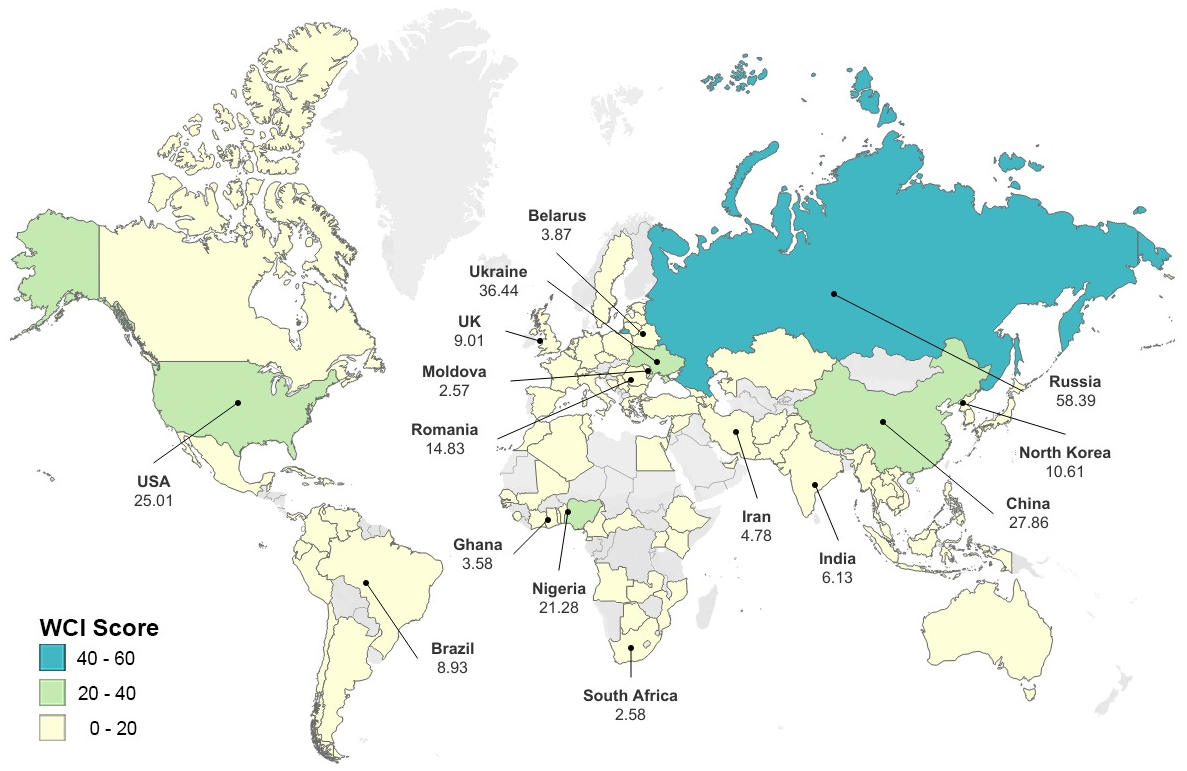Cybercrime has become a multitrillion-dollar industry and part of the larger scam economy that disproportionately targets small and medium-sized enterprises (SMEs). The cost of cybercrime approached $10 trillion in 2024 with threat actors present around the globe. The rise of digital transactions, artificial intelligence, cloud computing, and remote work has provided cybercriminals with countless new opportunities to exploit businesses. Moreover, rightsizing efforts within the US government and ongoing global supply chain risks have increased areas for cybercriminals to target small businesses. While large corporations invest heavily in cybersecurity, many small businesses struggle with limited resources, making them vulnerable to attacks that can have devastating financial consequences. The scam economy is evolving rapidly, using artificial intelligence, automation, and social engineering to exploit weaknesses in business systems. Understanding the nature of these threats and taking steps to mitigate them is crucial for survival.
In this blog post, we delve into the scam economy, what it is, and highlight major scams and their potentially significant impact on SMEs. We also discuss cybersecurity solutions for small businesses like Nessus and Nessus Expert from cybersecurity leader Tenable. These solutions provide comprehensive protection by identifying vulnerabilities before they can be exploited, protecting SMEs worldwide. Be sure to follow us on LinkedIn. Now let’s jump in.
Disclosure: At ClearSky 2100 Ventures, our portfolio partly consists of affiliate partnerships. We may earn a small commission from buying links on our site at no cost to you.
In 2023, nearly 350 billion emails were sent every day, of which over 45% were classified as spam.
SMEs and Their Impact on the Global Economy
Small and medium enterprises (SMEs) play a crucial role in the global economy, contributing to job creation, innovation, and industry growth. Globally, they account for 90% of employment and 50% of GDP. In the United States, small businesses (firms with 249 employees or less) accounted for 55% of the 12.9 million net job gains across firms of all sizes since 2021. Despite their global economic importance, many of these businesses lack the necessary cybersecurity measures or financial resources to hire teams to protect against fraud, ransomware, and phishing attacks. The increasing complexity of cyber threats makes it essential for SMEs to adopt a proactive approach to digital security. Absent a solid defense strategy, they risk significant financial losses, operational disruptions, and reputational damage.
The Scam Economy: A Growing Global Threat
The global scam economy is broad, global, and growing. It consists of an interconnected web of fraudsters, hackers, and cybercriminals who manipulate technology to exploit businesses and individuals. Digital fraud is no longer limited to isolated incidents but has become a structured, professionalized industry. Criminal networks operate on a large scale, developing sophisticated tools and techniques that bypass traditional security measures. Expanding cloud services, e-commerce, mobile applications, and cryptocurrency platforms have created new attack surfaces, making businesses more susceptible to security breaches.
Cybercriminals constantly adapt to new technologies, finding new ways to deceive business owners, employees, and customers. The recent Gmail phishing scam Astaroth targeting the 1.8 billion Gmail users with the ability to bypass Two-factor authentication further demonstrates increasing hacker sophistication. Small businesses are especially at risk because they often lack the security expertise and resources to combat these evolving threats. Scammers target SMEs using a combination of deception, hacking, and financial fraud, leading to billions of dollars in losses annually. Without proper cybersecurity strategies, businesses will continue to fall victim to the ever-expanding scam economy.
Where Most Cybercrime Originates
Cybercrime is a global industry with operations spanning multiple countries, often originating from regions with weak law enforcement oversight, political instability, or limited cybersecurity regulations. Many of the most sophisticated cyber threats targeting small businesses come from organized crime groups, nation-state actors, and independent hackers operating in cybercrime hotspots. These regions provide a safe environment for cybercriminals to launch attacks while minimizing the risk of prosecution.
Eastern Europe, particularly Russia and Ukraine, has long been a hub for cybercriminal organizations specializing in ransomware, banking fraud, and phishing scams. Many of the most notorious ransomware groups, such as REvil and Conti, have ties to this region, using advanced malware to extort businesses worldwide. Attackers based in these countries often target Western businesses, exploiting security vulnerabilities and demanding large ransom payments in cryptocurrency to avoid tracing.
China is another major source of cybercrime, particularly in the form of state-sponsored hacking and intellectual property theft. Many cyberattacks originating from China focus on stealing trade secrets, conducting industrial espionage, and compromising government networks. These operations often target small businesses involved in supply chains, making SMEs a critical entry point for larger breaches.
World Cybercrime Index
West Africa, particularly Nigeria, is known for social engineering scams such as business email compromise (BEC) and advance-fee fraud. Cybercriminals in this region rely on deception, posing as legitimate business contacts to trick companies into making fraudulent payments. The impact of these scams is immense, causing billions of dollars in losses to businesses globally each year.
North Korea has become a rising cybercrime threat, using hacking operations to fund its government. North Korean cybercriminals engage in financial fraud, cryptocurrency theft, and ransomware attacks, often targeting financial institutions and businesses with weak cybersecurity defenses. The Lazarus Group, a North Korean state-backed hacking organization, has been linked to some of the most high-profile cyberattacks in recent years.
Cybercrime is not limited to specific countries but is often concentrated in regions where law enforcement has difficulty tracking and prosecuting digital criminals. Many cybercriminals operate in decentralized networks, using anonymity tools and the dark web to conduct illegal activities. The global nature of cybercrime makes it difficult to combat, reinforcing the need for businesses to adopt robust security solutions to detect and prevent threats before they cause significant damage.
The Cost of Cyber Scams to Small Businesses
Cyber scams inflict significant financial damage on small businesses. The impact of a cyber attack on SMEs is multifold, including
- Revenue
- Reputation
- Financial
- Data
The economic burden of these scams is staggering, with SMEs collectively losing billions of dollars each year. Let’s take a look at some of the more popular cyber scams on small businesses and their impact.
74% of organizations have publicly exposed storage containing sensitive information such as customer data, employee information, or business IP
Ransomware attacks
Ransomware is a type of malware that prevents you from accessing your device and the data stored on it, usually by encrypting your files. These attacks have become increasingly destructive, with the average ransom demand now exceeding $100,000 per incident. Worldwide, ransomware attacks exceeded 315 million, accounting for over 70% of all cyber attacks in 2023. However, the real cost goes beyond the ransom itself, as businesses experience downtime, data recovery expenses, and potential legal penalties. In total, ransomware damages exceeded $20 billion in 2021. Damages are forecasted to reach $265 billion by 2031, with attacks on businesses, consumers, or devices occurring every 2 seconds.
The Business Email Compromise (BEC) scam
Email is the backbone of all business and communication, with the average person checking messages 15 times per day. The Business Email Compromise scam tricks employees into sending payments to fraudulent accounts, often causing irreparable financial harm to businesses with limited cash reserves. While it is estimated that BEC threat actors are located in more than 50 countries, Nigeria is home to 50% of all BEC actors. The BEC scam costs businesses an estimated $26 billion every year. These attacks account for 40% of all cybercrime losses globally, affecting 177 countries.
Phishing scams
Phishing is a type of cyber-crime whereby cyber criminals send spam messages containing malicious links, designed to get targets to either download malware or follow links to spoof websites. Phishing scams are the most common type of attack on Asian businesses. In 2023 nearly 350 billion emails were sent every day, of which 45% were classified as spam. Small businesses, which often lack advanced email filtering systems, financial resources, and trained staff, are prime targets. A single phishing email can cost a business between $50,000 and $100,000.
Fake invoices and payment fraud schemes
The fake invoices and payment fraud schemes account for tens of billions of dollars in annual losses worldwide. Every $1.00 in fraud costs small businesses $4.41 in economic and financial impact. In fake invoices schemes, scammers impersonate suppliers or vendors, tricking businesses into making payments to fraudulent accounts. Since many SMEs rely on manual invoicing processes, they are particularly vulnerable to this type of fraud.
The growing cost of cyber scams highlights the urgent need for small businesses to invest in robust cybersecurity measures. Without proper protection, these businesses risk losing critical financial resources and customer trust, making recovery difficult or even impossible.
51% of small businesses have no cybersecurity measures in place at all.
Key Vulnerability Flaws in SMEs
Small businesses face multiple cybersecurity challenges, including
- Limited resources
- Outdated security measures
- Lack of awareness about emerging threats
Many SMEs still operate under the assumption that cybercriminals only target large corporations, but statistics show otherwise. Cyberattacks against small businesses have increased dramatically, with nearly 61% of all cyberattacks worldwide targeting SMEs. This alarming trend demonstrates the need for businesses to strengthen their security posture. The most common vulnerabilities include
- Weak authentication processes
- Outdated software
- Inadequate employee training
Poor password management remains one of the leading causes of data breaches, as many small businesses fail to implement multi-factor authentication. Unpatched software leaves security gaps that cybercriminals can easily exploit, while untrained employees often fall victim to phishing scams. Small businesses must recognize these weaknesses and take immediate steps to address them before they become the next victims of a cyberattack.
Cyber Risks for Businesses with Fewer than 50 Employees
Small businesses with fewer than 50 employees face significant cybersecurity risks due to their limited IT capabilities. Many of these businesses operate without dedicated IT staff, relying on basic security solutions that do not provide comprehensive protection. Because of their small size, they cannot often monitor their systems for threats, making them easy targets for cybercriminals. Although many of these companies may be local retail establishments, they can include R&D teams with highly sensitive information in areas such as biotechnology, industrial design, creatives, etc.
Small businesses also heavily depend on cloud-based platforms, introducing a new set of security challenges. Many small businesses use cloud services for data storage, financial transactions, and customer communications without implementing adequate security controls. Hackers exploit misconfigured cloud settings and weak credentials to gain unauthorized access to business systems.
Internal threats are also a growing concern for smaller businesses. Employees with broad access to sensitive data increase the risk of accidental data leaks or insider fraud. Without strict access controls and monitoring, or employee agreements and NDAs, businesses remain vulnerable to both external and internal cyber threats.
Cyber Risks for Businesses with More than 200 Employees
Larger SMEs with more than 200 employees have different cybersecurity challenges, often related to managing complex IT infrastructures. As businesses scale, they incorporate multiple software platforms, cloud applications, and third-party services, increasing their attack surfaces. The more systems a business uses, the more potential entry points exist for cybercriminals. Optimizing their tech stack by consolidating various technology platforms can better monitor vulnerabilities and reduce exposure.
A larger workforce means a greater risk of human error. On average, employees check their emails 15 times per day. This increases the risk of unintentionally downloading malware, clicking on phishing links, or reusing weak passwords, putting business data at risk. Cybersecurity training and strict access controls are critical for businesses with growing teams.
Regulatory compliance adds another layer of complexity for larger SMEs. Businesses handling customer data, financial information, or medical records must comply with industry-specific security regulations. Failing to meet these standards can result in heavy fines and legal consequences. Maintaining compliance requires a well-structured cybersecurity strategy, which many SMEs struggle to implement effectively.
How SMEs Can Combat the Scam Economy
Fighting back against the scam economy requires a proactive approach to cybersecurity. Businesses cannot afford to rely on outdated security measures or assume they are too small to be targeted. Cybercriminals actively exploit vulnerabilities in small business networks, making it essential for SMEs to invest in modern cybersecurity solutions.
A comprehensive security strategy should include regular vulnerability assessments, strong authentication protocols, and continuous employee education. Businesses must implement network monitoring tools, encryption technologies, and strict access controls to protect their data. Preventative measures are far more cost-effective than dealing with the aftermath of a cyberattack.
Some important and low-cost recommendations that small businesses can implement to guard against cyber attacks include:
- Be careful with what information you share online or on social media. By openly sharing things like pet names, schools you attended, links to family members, and your birthday, you can give a scammer all the information they need to guess your password or answer your security questions
- Don’t click on anything in an unsolicited email or text message asking you to update or verify account information. Look up the company’s phone number on your own (don’t use the one a potential scammer is providing) and call the company to ask if the request is legitimate.
- Carefully examine the email address, URL, and spelling used in any correspondence. Scammers use slight differences to trick your eye and gain your trust.
- Be careful what you download. Never open an email attachment from someone you don’t know, and be wary of email attachments forwarded to you.
- Set up two-factor (or multi-factor) authentication on any account that allows it, and never disable it.
- Verify payment and purchase requests in person if possible or by calling the person to make sure it is legitimate. You should verify any change in account number or payment procedures with the person making the request.
- Be especially wary if the requestor is pressing you to act quickly.
Why Tenable Nessus Expert is a Must-Have for SMEs
ClearSky 2100 Ventures collaborates with top-tier companies to provide solutions that facilitate the growth and success of SMEs worldwide. For small businesses, cybersecurity remains an overlooked but, in fact, mission-critical aspect of their growth and success.
It takes an average of 272 days to identify and contain an active (data) breach across all industries
Tenable is a global leader in cybersecurity, specializing in exposure management and vulnerability assessment solutions. The company is best known for Tenable Nessus, the industry’s most widely deployed vulnerability scanner, helping businesses identify and remediate security weaknesses before they can be exploited. Tenable provides comprehensive security solutions for IT, cloud, web applications, and operational technology (OT), ensuring businesses can detect and mitigate risks across their entire digital infrastructure. The company serves multiple sectors, including critical infrastructure, generative AI, real estate, healthcare, and financial services.
Under its Nessus product, Tenable offers two versions: the Tenable Nessus Professional and the Nessus Expert. The Professional version is designed mainly for pen testers, consultants, and security professionals.
Tenable Nessus Expert is one of the most effective cybersecurity solutions available for small businesses. It provides an advanced vulnerability assessment system that helps SMEs detect and remediate security weaknesses before they can be exploited. The platform offers in-depth security scanning across all business systems, including cloud applications, web servers, and internet-facing assets.
One of the biggest advantages of Nessus Expert is its ability to identify and prioritize the most critical threats. The platform uses predictive risk modeling to analyze vulnerabilities, allowing businesses to focus on the most urgent security issues. By scanning for software flaws, misconfigurations, and outdated patches, Nessus Expert significantly reduces a company’s exposure to cyber threats. Key advantages of the Expert versus the Professional version include:
- Over 500 prebuilt scanning policies
- Multiple scanning models, including cloud infrastructure, external attack surfaces, and web applications
- Ability to add multiple domains
With cybercrime becoming more sophisticated, SMEs need reliable security solutions to protect their businesses. Tenable Nessus Expert provides the necessary tools to stay ahead of cybercriminals, ensuring that businesses can operate securely in an increasingly dangerous digital landscape. Investing in strong cybersecurity is no longer an option—it’s essential for survival.
Remaining Vigilant in a Constant Threat Environment
Today, more than 66% of all people on earth use the internet. Moreover, hackers and cybercriminals aren’t giving up. They are rising in numbers and becoming more aggressive and sophisticated. The scam economy continues to grow, posing significant risks to small businesses worldwide. SMEs, regardless of size, are prime targets for cybercriminals due to their limited cybersecurity resources. From phishing scams to ransomware attacks, these threats can cause irreversible damage to a company’s finances and reputation.
Addressing these challenges requires a proactive approach. Tenable Nessus Expert provides SMEs with the tools needed to identify, assess, and remediate vulnerabilities before they are exploited. By implementing strong cybersecurity measures, training employees, and leveraging advanced security solutions like Nessus Expert, businesses can protect themselves from the ever-growing cyber threat landscape.
No SME is too small to be targeted. Gone are the days when cybersecurity was viewed as optional. Today it’s a necessity. Investing in comprehensive vulnerability assessment solutions ensures businesses can operate securely, unlocking their upside while protecting their downside in an increasingly digital and scam-ridden economy.









